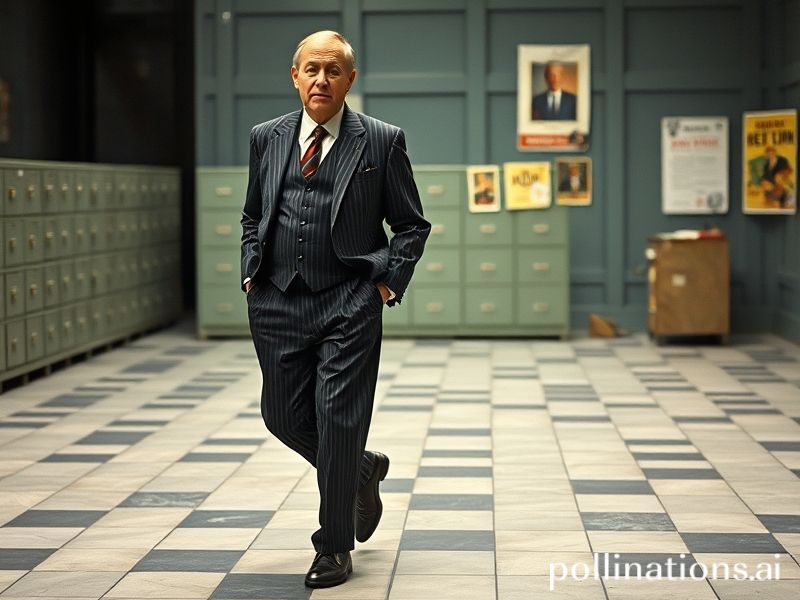John Cleese: Britain’s Accidental Global Ambassador of Beautiful Despair
The Ministry of Silly Walks Goes Global: John Cleese and the Export of English Despair
By the time you read this, somewhere between São Paulo and Stockholm a streaming algorithm has already nudged a bored teenager toward “Monty Python and the Holy Grail.” That click is not merely late-night procrastination; it is the latest data point in a 55-year experiment that proves one of Britain’s most lucrative post-imperial exports is not tea, oil, or royal scandals, but the precise comic nihilism of John Cleese.
Born in Weston-super-Mare in 1939—just in time for the Luftwaffe to provide a master class in absurd timing—Cleese learned early that civilization is a thin crust over boiling hysteria. He has since spent his life translating that insight into a universal dialect of exasperated deadpan. The rest of the planet, busy manufacturing its own local catastrophes, gratefully bought in.
Consider the receipts. “Fawlty Towers” still sells in 108 territories; Chinese bootlegs subtitle Basil’s tantrums as 英式暴躁 (roughly “English rage-fit”), while German state television schedules it after Bundesliga matches to help citizens metabolize collective shame. Netflix Brazil reports that “A Fish Called Wanda” spikes whenever the real economy tanks—viewers apparently find it comforting to watch Anglo-American alliances collapse over a jewel heist rather than, say, trade policy.
Cleese himself has become a peripatetic monument to post-Brexit irony. One week he’s lecturing on creativity in Toronto, the next he’s apologizing for calling the English electorate “the most gullible in the world” from a hotel balcony in Monaco. He insists he’s not fleeing the UK, only “commuting between tax jurisdictions that still remember what jokes are.” The British press harrumphs; meanwhile, the EU’s cultural-funding spreadsheets quietly list “Cleese, J.” under intangible heritage, valued at €3.7 million in soft-power goodwill.
The global South views him with warmer fatalism. Indian stand-up comics cite Fawlty as proof that colonial rudeness can be reverse-engineered into anti-establishment satire; Nigerian podcasters replay his eulogy at Graham Chapman’s funeral (the one where he said “Good riddance to the freeloading bastard”) as a masterclass in grief management. Even the Taliban, in a surreal 2020 propaganda clip, spliced Cleese’s Hitler-skit goose-step into a montage mocking Western decadence—unaware, perhaps, that the joke was originally on Englishmen pretending to be Germans pretending to be English.
At 84, Cleese has announced yet another farewell tour, this one titled “Why There Is No Hope.” Tickets in Melbourne sold out in six minutes, faster than vaccines during a fresh outbreak. Reviewers praise the show’s therapeutic value: the audience leaves convinced that if a tall man who once taught at Cambridge can spend two hours cataloguing human incompetence and still order a decent Negroni afterward, maybe tomorrow’s headlines won’t be fatal.
Of course, the cynics—this publication included—note that despair has become a profitable brand. Cleese’s production company, run by his fourth ex-wife and a revolving door of litigation lawyers, licenses “Don’t Mention the War” T-shirts to souvenir shops in seven languages. The man who skewered consumerism now appears, via hologram, in Duty Free zones reminding travelers that “the only thing lighter than our humor is your wallet.”
Yet the joke persists because it carries a stubborn moral payload: systems fail, pomposity swells, empires collapse, but the individual conscience can still choose to laugh instead of shoot. In a world where presidential tweets trigger market avalanches and climate scientists speak in escalating degrees Celsius, Cleese’s comedy offers a rare international currency that actually gains value during crisis. Call it the Schadenfreude Standard: as everyone else’s certainties melt, his exasperated shrug looks increasingly like prudence.
So when the lights dim in Singapore or Seattle and Cleese ambles onstage to announce that humanity peaked sometime around 1974, remember you are not merely watching an elderly comedian. You are witnessing one of Britain’s last functioning diplomats—an accidental envoy whose passport is stamped by every culture that has looked into the abyss and decided the only grown-up response is a perfectly timed double-take.
In the end, Cleese’s greatest export isn’t even laughter; it’s permission. Permission to admit that the planet is run by Fawlty-grade incompetents and, against all odds, to find that confession liberating rather than terrifying. If that isn’t soft power, nothing is.







